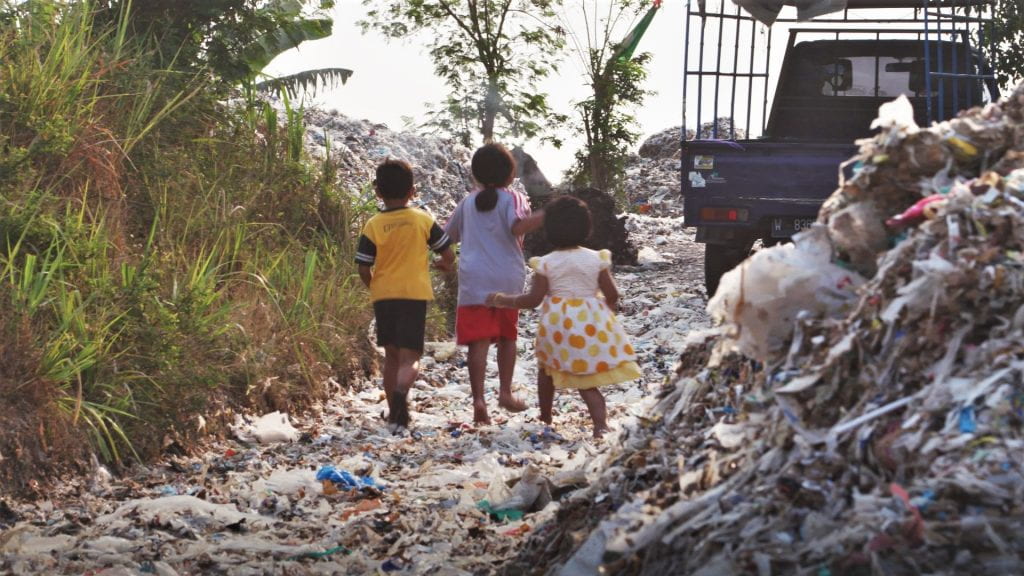Directed by WashU alumna Deia Schlosberg, The Story of Plastic (2019) covers the life cycle of plastic from production to pollution, from refinery to recycling, dismantling the myths of Big Plastic and exposing the human and environmental devastation along the way.
Reducing single-use plastics is an important priority for the Office of Sustainability, which is why watching The Story of Plastic together was the kick-off event for the virtual Plastic-Free Ecochallenge last July, and Deia was the subject of the Alumni Profile series in September.
“For me and my skill sets and experiences, documentary filmmaking is the best way that I know to create tools to support movements for social and environmental justice,” says Deia, when asked about how her career as a documentary filmmaker has changed her as an activist. “Those are the things I feel strongest about using my limited time on this planet to work toward.”
“The Story of Plastic” Panel Discussion
A year and a half since the debut of The Story of Plastic, Deia is returning to WashU—albeit virtually–for a student-moderated panel discussion hosted jointly by the Office of Sustainability and Dining Services. Other panelists include Jenny Wendt, the Plastic Waste Reduction Campaign Manager with the Mississippi River Cities and Towns Initiative, Andrew Watling, the Associate Director of Dining Operations at WashU, and Cassie Hage, the Associate Director at the Office of Sustainability.
The panel will take place virtually on April 1st, following a 7-day period in which participants can register for a free screening of the movie. During the panel discussion, participants will be encouraged to ask questions. The goal of the panel is to unpack the content of the documentary and explore what we can do on the individual, institutional, and system-wide level to impact significant change on the plastics front.
While this event is free and open to the public, the sponsors are strongly encouraging the WashU community to take advantage of the free documentary screening period before joining for the panel discussion. Students can be on the lookout for low-impact dining specials and giveaways to support a reusable lifestyle!
The Mississippi River Plastic Waste Initiative
As Earth Day approaches, the Mississippi River Plastic Waste Initiative is working in coordination with the UN Environment Programme, University of Georgia, and the National Geographic Society on an initiative to reduce plastics in the Mississippi River. Through a citizen science approach, this program invites residents of St. Paul, St. Louis, and Baton Rouge to attend cleanup events and help collect data on river plastics.
“Citizen science allows us to work together with communities to capture data on what is entering the environment, close to the source,” said Jenna Jambeck, Distinguished Professor in Environmental Engineering at the University of Georgia and National Geographic Fellow. “This scale of data collection would be impossible without the participation of thousands of community members along the river to inform upstream solutions to plastic pollution.”
The primary goal of this waste initiative is to educate. While many know of the detrimental effects of “ocean plastics,” the issue of river plastics often slips off their radars. The fact is, inland waters are a major contributor to ocean plastics, as litter can move through a city’s storm drains and tributaries into the river, thus making their way into the ocean.
By cataloguing the types and brands of litter along selected cities that represent the upper, middle and lower Mississippi river, the data will indicate areas of focus, such as industrial, consumer, and more. This will help create critical baselines for decision-makers in both the private and public sectors and inspire action and effort toward reducing plastic pollution flowing into the river—and therefore, into the ocean.
“Single use plastics have created huge problems with solutions that are both simple and complex,” says Cassie Hage, Associate Director of the Office of Sustainability. “However, the most powerful thing about these solutions is that we only have to look back 60 or 70 years, or even many present-day cultures, to understand how we can live without them. It will take a mind shift, but it is possible—and doing so will support biodiversity, combat climate change, and fight environmental injustices.”
